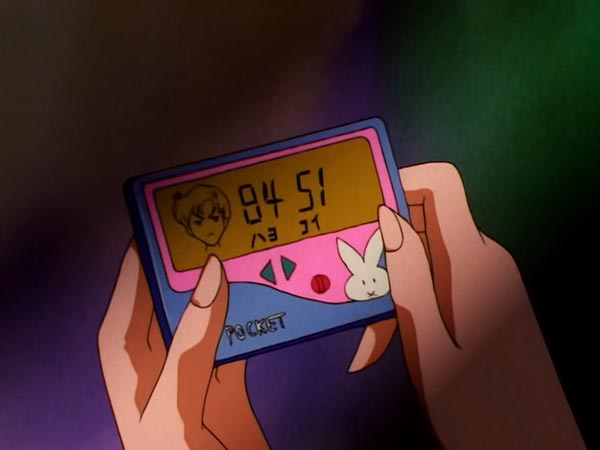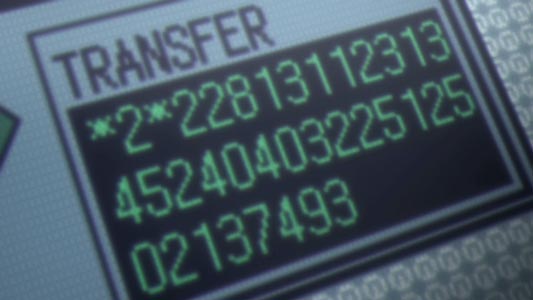For example, 39 mean "thank you," 893 means yakuza ヤクザ, 4649 means yoroshiku よろしく, 084 means ohayo おはよ, 0833 means oyasumi おやすみ, 3470 means sayonara さよなら, and so on.
Anime: Bishoujo Senshi Sailor Moon SuperS, 美少女戦士セーラームーンSuperS (Episode 143, 天馬を信じる時!4戦士の超変身)
Rules
The conversion from numbers to Japanese characters is kind of complicated, specially if you know nothing about Japanese. In general, each number is mapped to one syllable, represented by one kana character.Syllables may come from the names of the numbers in Japanese, the words for counting in Japanese—in other words: the kun'yomi and on'yomi readings of the kanji—the katakanizations of the names of English numbers, the shape of the number, as well as some other things.
Here are possible conversions of each number:
0
zero ゼロ
rei 零 ("nada.")
nai ない (means "not," mean 0 is nothing.)
o お (because the letter "o" looks like 0.)
maru 円 ("circle")
wa わ (from the shape.)
1
ichi 一
hitotsu 一つ
wan ワン
ai アイ (katakanization of the English letter "I," because "I" looks like 1.)
bou 棒 (a "stick," because it looks like a stick.)
2
ni 二
futatsu 二つ
tsuu ツー, touu トゥー
ji 次 (from "second son," jinan 次男, etc.)
3.
san 三
mittsu 三つ
surii スリー
4
yon 四, shi 四
yottsu 四つ
foo フォー
ho ホ
5
go 五
ko こ (go ご without dakuten.)
itsu-tsu 五つ
faibu ファイブ
6
roku 六
ru る (from saying roku fast.)
muttsu 六つ
shikkusu シックス
7
nana 七, shichi 七
nanatsu 七つ
sebun セブン
8
hachi 八
ba ば (this is ha は with dakuten.)
yattsu 八つ
eito エイト
9
kyuu 九, ku 九
kokonotsu 九つ
nain ナイン
. (a dot)
ten 点
10
too 十 (the number 10 is normally juu 十, but in counters like tooka 十日, "ten days," it's too.)
(sometimes te て, tai たい, dai だい, not sure why.)
Translations
For reference, a list of Japanese pager codes and their translations to English.4649
yon-roku-shi-ku
yoroshiku よろしく
(greeting.) Please take care of me. Let's work together. Please welcome me. Etc.
5963
go-ku-roku-san
gokurousan ご苦労さん
Thank you for your work.
39
san-kyuu
sankyuu サンキュー
Thank you. (katakanization.)
49
shi-kyuu
shikyuu 至急
Urgent.
86
hachi-roku
haroo ハロー
Hello. (katakanization.)
084
o-hachi-yottsu
ohayo おはよ (ohayou お早う)
Good morning.
0833
o-yattsu-surii-mittsu
oyasumi おやすみ
Good night.
3470
san-yottsu-nana-rei
sayonara さよなら
Goodbye.
101010
ta-da-ichi-maru
tadaima ただいま
I'm back.
889
hachi-yattsu-ku
hayaku 早く
Quick. Come quickly.
0906
o-ku-rei-roku
okureru 遅れる
To be late. [I'll] be late.
8110
hachi-ichi-too
baito バイト
Part-time job.
4510
shi-go-too
shigoto 仕事
Job. Work.
14106
ai-shi-te-ru
aishiteru 愛してる
[I] love [you].
724106
nana-ni-shi-te-roku
nanishiteru 何してる
What [are you] doing?
10139
da-ichi-surii-kyuu
daisuki 大好き
I love you <3
15
ichi-go
ichigo イチゴ
Strawberry. (also a person's name.)
893
yattsu-ku-san
yakuza ヤクザ
Huh?! You don't know who's the Yakuza??!
801
yattsu-o-ichi
Yaoi やおい
.59
ten-go-ku
tengoku 天国
Heaven.
1564
hitotsu-go-roku-shi
hitogoroshi 人殺し
Murderer. (or murdering, as in, murder that takes place)
18782
ichi-yattsu-nana-yattsu-tsuu
iyana yatsu いやなやつ
Unpleasant guy.
(18782 + 18782 = ...)
37564
mittsu-nana-go-roku-shi
minagoroshi 皆殺し
Massacre. Killing everybody.
Anime: Bishoujo Senshi Sailor Moon SuperS, 美少女戦士セーラームーンSuperS (Episode 143, 天馬を信じる時!4戦士の超変身)
8451
hachi-yon-go-ichi
hayogoi ハヨゴイ
hayokoi ハヨコイ (diacritic dropped.)
hayaku koi 早く来い
Come quickly.
See also: Darling in the FranXX: Code Numbers to Names Explained, because the names of the characters in the FranXX anime come from this sort of wordplay.
History
In 1990 A.C., there existed a tool called a "pager." It was a primitive method of communication used by cavemen, akin to using rocks and sticks to make a fire. Impressively, some people still use it even in current year, even though mostly everyone else just talks on Facebook, instead.Pocket Bell
In Japan, there were pagers called poketto beru ポケットベル, "pocket bell," not to be confused with "pocket monsters," poketto monstaa ポケットモンスター, which are something else.The term was sometimes abbreviated to pokeberu ポケベル, not to be confused with pokemon ポケモン, which, again, is something else.
In these Pocket Bell™'s people sent short messages to each other, which is like what you'd do in Twitter, except not exactly.
Evolution
Back in a time and society I can't really imagine, without cellphones and internet, and without anime streaming—oh, the horror!—pagers were capable of one thing: beep. That's it.The first version of a pager that had a tangible function for a 21th century person was the kind that had multiple different tones.
Someone wouldn't send a "message" or "code" to your pager, they'd just make it beep in a way or another. For example: a doctor could know from different tones if they were supposed to go to the ICU or someone was calling him on the telephone.
I want to reiterate this: you owned a pager to know someone called you on the phone, so you'd walk TO THE PHONE to talk ON THE PHONE to that person. You couldn't talk to them ON THE PAGER! Those were different times. [Why Pagers Still Matter: The History of Pagers (1921-2019) - spok.com, accessed 2020-02-09]
Eventually, pagers evolved from beeping to sending numbers and text in short messages, and people who spoke English were able to send messages to each other, and so were the Japanese people.
However, at the time of the Pocket Bell boom, which was by 1990's, it couldn't send Japanese text, no kana nor kanji, only about 10 digits per message. If you consider that pagers once could only send different TONES—not even text—then, yeah, 10 digits is progress, I guess.
Later, it did become able to send kana and some kanji. [ポケベルの歴史 - kogures.com, accessed 2020-02-09]
Anime: Steins;Gate (Episode 8)
- In Steins;Gate, there's a scene where a message is sent to a pager. The message is:
- yasai kuu to genki na ko wo umeru
野菜食うと元気な子を産める
If [you] eat vegetables, [you] birth a healthy child.- Converted to kana:
- やさいくうとげんきなこをうめる
- Converted to numbers:
- *2*228131123134524040322512502137493
- Apparently, this is based on the gojuuon 五十音 input of key pads. Everything after *2*2 is converted to kana. And each kana is represented by two digits, a row-column combination.
- If you press 1, you get the vowel row, a-i-u-e-o あいうえお, so 11 = a, 12 = i, 13 = u, 14 = e, 15 = o. If you press 2, you get the ka-row, ka-ki-ku-ke-ko かきくけこ, so 23 = ku, for example.
- Furthermore, diacritics are input separately, so they take an extra 2 digits
- In the anime, the original message was too long to be sent, and Okabe had to change the word taberu たべる, "to eat," to kuu くう, which is a synonymous word used more by men. (see: female language.)
- Based on this, the code shown in the anime is wrong.[8話Q&Aと小ネタ - w.atwiki.jp, accessed 2020-02-09]
- The correct code is:
- *2*281311223134524040322512502137493
- Observe:
- 81, 31, 12
や, さ, い
ya, sa, i - 23, 13, 45,
く, う, と
ku, u, to - 24, 04, 03, 22, 51
け, ゛, ん, き, な
げ, ん, き, な
ge, n, ki, na - 25, 02, 13, 74, 93
こ, を, う, め, る
ko, wo, u, me, ru
- 81, 31, 12
Japanese High School Girls are Scary
Originally, the pocket bell was meant to be used by Japanese businessmen.You would, for example, send to someone's pager what phone number they're supposed to call. Then that person would go to a phone, and call that number. That's why it could only send digits.
If you're having trouble understanding the usefulness of pagers, allow me to explain further: pagers were mobile devices, you could carry them around, but phones were not, they had to be plugged onto a wall somewhere.
So, again: you sent a number to a pager, then you'd be waiting beside your phone, for the guy whom you just sent the number to get to their phone, and THEN call YOU. Madness!
Unexpectedly, Japanese high school girls were reportedly delighted by the advent of the Pocket Bell, because they could communicate with their friends without having to talk out loud on the phone where they could be heard by everyone in the family without an atom of privacy. [Japan Teens Flip for Private Pagers - nytimes.com via web.archive.org, accessed 2020-02-09]
It was probably legit unexpected, because, seriously, THIS THING CAN ONLY SEND NUMBERS!!! How did they even manage to talk with each other?! Is this that "love knows no barriers" kinda thing? Is the power of friendship that much strong? Just... just how did these Japanese high school girls managed to Morse-code each other like this???
Anyway, because this, somehow, did actually happen, today, the crypt messages those "e-mail friends," meeru-tomo メール友, or rather, "bell friends," beru-tomo ベル友, sent to each other remain a part of the Japanese culture, and consequently of the anime culture.
And so, even now, even though we have Twitter now, you can still find numbers representing Japanese words in Japanese media, referencing something that Japanese high school girls were using around 30 years ago.


No comments: